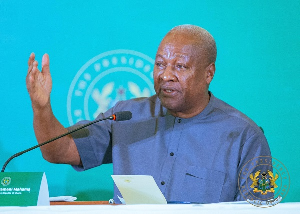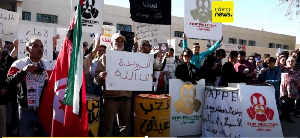Background
Kowus was a merger with R.T. Briscoe. This merger was effected during the Acheampong regime. During the 'rampage' of 1979, Kowus (inclding R.T Briscoe) was taken over by the State and renamed Automotive Technical Services (ATS.)
In 1997, a new company, SABAT Motors took over ATS. Now ATS had been valued in 1995 at 5.7 billion cedis but when the sale was finally made, it was at 3.4 billion cedis. This is because SABAT Motors bought only the R.T. Briscoe share in ATS, and returned the Kowus portion, which had been a confiscated asset to the owners.
Mr Kwamena Bartels, MP, claims that the sale of ATS was wrong because, the new owners never paid a pesewa for it. What they did, according to him, was pledge payment for the company.
Having been able to convince the DIC about their ability to pay, they gained custodianship of the compnay, and then used the company's documents to secure a loan from the Ghana Commercial Bank to pay their indebtedness to the DIC.
Bartels ALLEGES that SABAT directors were able to get through all this because of the tribal and political affiliation. All the four top directors are from the Volta Region. It is also being alleged that they had the backing of a Minister from the same Region. The DIC boss is also from the Volta Region.
The other snag is that workers of the company allegedly owned 10 per cent of Kowus shares in ATS, but SABAT never paid them their share during their period of operation.
It is not clear now whether SABAT had an obligation to pay since the Kowus' shares, and therefore, that of the workers, was returned to the family of Kowus. If that was so, the workers feel betrayed because the terms of the purchase by SABAT was not made clear to them. It appears the workers had all along believed or been made to believe that their 10 per cent shares was still intact.
Now the Ministry of Trade and Industries has recommended that the contract with SABAT be suspended and another look taken at the whole issue. SABAT says the Ministry has no right to suspended their contract. The matter is now set for the courts and everybody should be careful how they make pronouncements on it.
Latest update
Both the DIC and Directors of SABAT Motors have denied any wrong-doing in the purchase of the company.
According to the Public Relations Manager of DIC, the divestiture of ATS was done according to laid down procedures. He denied that ATS was valued at 5.7 billion cedis at the time of divestiture.
The highest bid, according to the DIC, was 3.8 b and although SABAT Motors offered C3.1b they were made to increase it to 3.7b
The DIC official said SABAT directors paid 10 per cent commitment as provided by law and settled the second instalment before they were handed the company. SABAT, according to the DIC has so far paid 1.82 b leaving a balance of 1.87b
" So it is not true that the company was handed over the company to the new owners when they had not paid even a pesewa. Nonetheless, the DIC has had to resort to court action to retrieve the remaining amount since the six months period granted by the DIC for the full payment for the enterprise has elapsed, but the directors have not been able to honour their obligation," the DIC official said.
Meanwhile the Directors of DIC have blamed the media for blowing out of proportion an internal affair of the company and stated that they have paid 50 per cent of the cost for the purchase of the company.
"What we owe is nobody's business, so long as we are determined to meet our financial obligation," they said.
They Directors and the Board blamed the rumpus in the company to an attempt to discipline a few workers for insurbordination adding ...."we shall not hesitate any longer in dealing with those who wish to gamble with the law and libel us with impunity."
On the issue of the 10% share of the workers this is what they said: "The issue of the 10% share holding for the workers did not form part of the purchase agreement. It was a decision grounded on mutual understanding and goodwill. The workers were to pay for the shares, which were being held in trust for them. We bought the company in an open bid during which many other interested groups fell by the wayside," the SABAT Directors and Board said.
General News of Wednesday, 20 May 1998
Source: --












